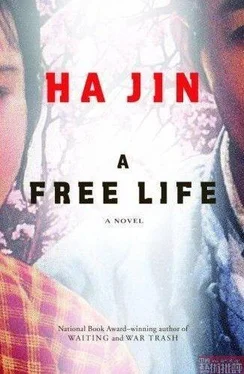"A mediocre cahver shouldn't be a big deal. People will judge zer book by its content."
"I want everything to be perfect."
Nan said no more. He felt Dick had overreacted to the cover, trite though it might be. Dick told Nan that the first run of this volume would be one thousand and that if all the copies were sold, the book would be a success. Nan was surprised by the small number and couldn't figure out why Dick was so eager to sell the book if he could hardly make any money from the sale-the publisher had agreed to pay him merely five percent of the list price for royalties. Dick mentioned that some journals might write about Unexpected Gifts. If the reviews were positive, they'd bolster the sale of the book.
"Yes, a favorable reception is more important," Nan said.
"That's true," agreed Dick. "Actually, I care more about the reviews than about the sale."
"Zat's a right attitude. Poetry isn't profitable anyhow." Despite saying that, Nan didn't fully understand Dick's reasons. Neither did he know that Dick could make money indirectly if the book was well received, because his school would give him a bigger raise and he'd get invited more often to read and conduct writing seminars at colleges and writers' conferences.
While the two friends chatted away, Pingping and Niyan were wrapping wontons in a corner. Dick was the only customer in the room, so Nan could sit with him for a while before business picked up.
DICK had continued his weekend meditation with the Buddhist group at a temple north of Emory. He tried to persuade Nan to join him, saying it would alleviate stress and make him peaceful. Nan wondered why Dick needed peace of mind if he wanted to write poetry. Didn't the poet need strong creative impulses? Wasn't it true that the more explosive his emotions were, the more powerful his poems would be? Yet out of curiosity Nan went to see the Buddhist group one Sunday morning.
Their temple was just two long ranch houses in a large wooded yard. It had been built recently, and each house was surrounded by a veranda and had more than a dozen doors. The place reminded Nan of a motel, with a large paved parking lot in the front and a few flower beds grown with clematis, jasmine, and chrysanthemums. Except for some tiny paper lanterns hanging under the eaves, nothing seemed to differentiate this temple from a family-run motel. Dick took Nan to the second house, but on the way there, they came upon the group they meant to join. The disciples were all sitting cross-legged in the lotus position on the expanse of grass in between the two houses. About half of them were locals, but there were four Tibetan men among them, all with leathery but energetic faces. It was a splendid fall day, warm and dry without a single fly or midge in the air. The stalwart Nepalese master, wrapped in a mud-colored robe, waved at Dick and Nan and nodded smilingly. He had a wattled chin and prominent eyes, which broadened some when he smiled. He was sitting on a round cornhusk cushion, and beside him on the grass was a cassette player. In front of him sat a small brass pot containing sand, wherein were planted sticks of incense, sending up coils of smoke.
Dick and Nan sat down beside a young woman in a sweater vest and white slacks. Another few people arrived. When everyone was seated on a hempen hassock provided by the temple, the master began to speak about the day's exercise. His English was nasal and undulating, which made it hard for Nan to make out every word, but he could follow the drift of what the man was saying. He was talking about meditation as a way to cleanse one's mind. "In fact," the master said, "our minds are in a state of chaos before we make effort to improve them. An unimproved mind contains a mixture of many things, benign and destructive, base and noble, good and evil. We all know that a person has biological genes, but the truth is that one also has cultural genes and spiritual genes. All these inherited elements affect one's inner life…"
Nan marveled at the master's expanded notion of the genes. The man must be quite learned, he decided. Nan glanced at the white woman sitting beside him, her face smiling with innocence and joy. "In our exercise today," the master went on, "we shall try to empty our minds and hearts. Forget everything and try not to feel any emotion, neither happiness nor sadness. Above all, forget yourself and who you are. In this way we can sink deep into our origins, experience total emptiness, and achieve genuine tranquillity."
A pair of cymbals started tinkling, and then from the cassette player came the slow, gentle, aerial music played on the bamboo flute. The sound often subsided as if about to disappear, but it always swelled back. The master's voice turned inaudible, though his lips were still stirring. All the disciples, eyes shut, were breathing re-laxedly with their hands on their laps, their palms upward. Nan followed suit. But he closed his eyes only halfway and felt as if the master were levitating.
Unlike the others, Nan couldn't concentrate on his breathing. He opened his eyes and looked around. Every face seemed carefree and serene, and many of them wore a knowing, inward smile that looked a bit mysterious. Nan shut his eyes and tried to let himself be transported by the music; still he couldn't get close to the nirvana that seemed to be admitting the others. His thoughts couldn't help but wander. He wondered if he should continue to write in Chinese. He had mailed out three poems to a literary journal in Taiwan two months earlier, but so far he hadn't heard from it. As for the magazines in mainland China, he wouldn't send them his work anymore after an editor had once written back and asked him to delete several lines that were too sensitive politically. Nan hadn't responded to that, so the poem had never seen print. Maybe he should translate some of his poems into English and try his luck with small magazines in America. Probably the miserable feelings that often surged in him originated from the fact that he couldn't see any possibility of publishing in Chinese, let alone establishing himself as a poet here. It was as if in front of him stood a stone wall inviting him to bump his head against it. If only he had come to America ten years earlier! Then he could definitely have given up his mother tongue and blazed his trail in English…
Somehow two ancient lines cropped up in his mind: "No prairie fire can burn the grass up / When the spring breeze blows, it will again sprout." Yes, he must have the spirit of the wild grass. However thick and impenetrable the wall before him, he must grow beneath it and even on it, like the invincible grass with blades that eventually would dislodge the rocks. This was the American spirit Whitman eulogized, wasn't it? Yes, definitely. He must figure out his own way of making poetry, and-
"All right, you can wake up now," said the master in an even voice.
All the people opened their eyes, their faces softened and their voices smaller. The master told them, "May you hold the peace in you. See you next Sunday."
When all in the group were on their feet, Dick asked Nan, "Well, what do you think?"
"I can see it works on everyone except me."
Dick laughed and slapped his back. "Come, let me introduce you to a few friends."
Nan looked at his wristwatch and said, "I have to go now. It's already past eleven." The Gold Wok opened at twelve noon on Sundays, so he had to rush back.
Dick didn't insist but asked Nan to join him here the next Sunday. Nan said he'd try his best. Actually, he wasn't interested in meditation. He wouldn't join the group again.
FINALLY Gerald's house was put up for auction, TO BE SOLD ON PREMISES as the sign on the lawn announced. For weeks people would stop by to look at the property, and when they saw the Wus in the front yard, they'd ask them about the neighborhood and the former owner of the home. Although empty of all the junk at last, the house looked more dilapidated than before. A pipe had burst in the basement and flooded a good part of the floor; the unfinished glassed-in porch looked like a boat cut in half, displaying a dark, gaping cabin. Worse yet, two of the windows had smashed panes now- someone had thrown rocks into the house. The neighbors all looked forward to the auction, which had been postponed once already.
Читать дальше












